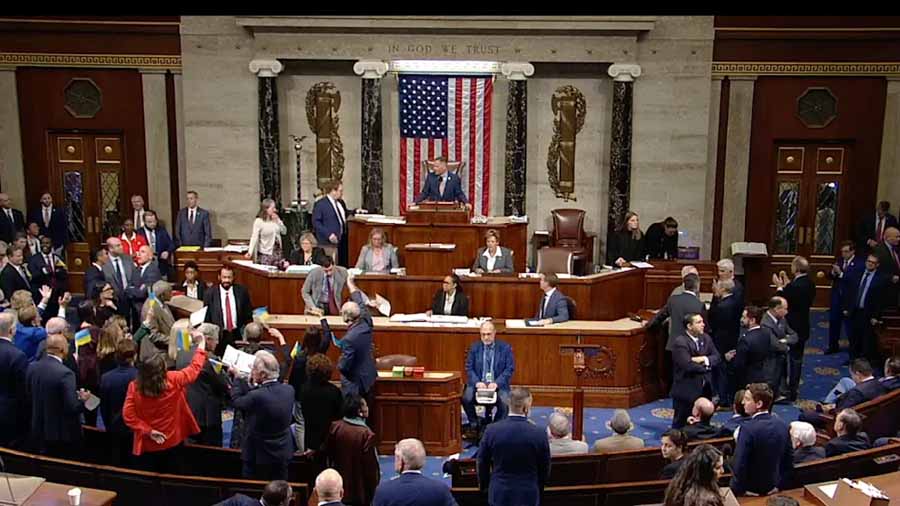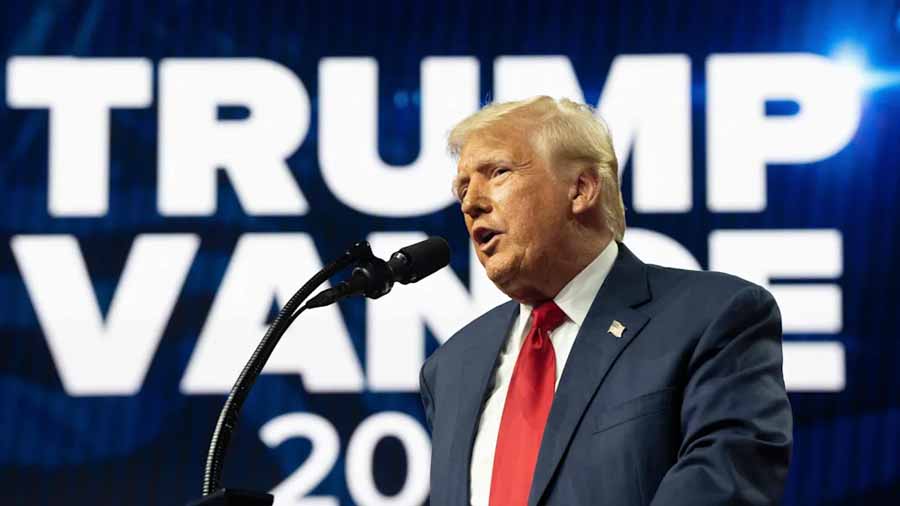Notifications

Posted by - News Staff![]() \
\
September 17, 2024 \
Filed in - Politics \
Decoding the GOP- Past-Principles-and Impact \
664 views \ 0 reviews
Pam Van Handel is the chairwoman of the Republican Party of Outagamie County. She stands in front of the party's offices in Appleton, Wisconsin.
DLNews Politics:
The Republican Party, commonly called the GOP (Grand Old Party), has shaped American politics for more than 150 years. Founded in 1854, the party’s trajectory has seen it play a decisive role in U.S. governance, from advocating for the abolition of slavery in its early days to championing conservative values and free-market principles in modern times.

: Interior view of the US House of Representatives.
Origins and Evolution of the Republican Party
The Republican Party was born in Ripon, Wisconsin, on March 20, 1854, as a response to the expansion of slavery into the western territories of the United States. At its core, the party sought to halt the spread of slavery and strengthen federal powers. The election of its first president, Abraham Lincoln, in 1860 marked a turning point in U.S. history. Under Lincoln's leadership, the Union's victory in the Civil War preserved the nation and led to the abolition of slavery, which became a defining achievement for the young party.
In the following decades, the Republican Party embraced a vision for economic growth, industrialization, and national expansion. However, the party's platform would evolve significantly in the second half of the 20th century. Beginning in the 1960s, the GOP adopted increasingly conservative positions, advocating for reduced government intervention, lower taxes, and a stronger emphasis on traditional social values.
Key Ideas and Modern Policy Positions
Today, the Republican Party is a beacon for conservative principles, emphasizing personal responsibility, a limited government role in daily life, and a robust, deregulated free market. The party advocates for:
- Economic policy: The GOP favors policies that support business growth, focusing on banks and industry and removing trade restrictions. Deregulation and low taxation are central pillars of its economic philosophy.
- Social values: The Republican Party often promotes traditional values, supporting policies that limit government involvement in social issues while favoring personal freedoms and responsibility.
- Foreign policy: Historically, Republicans favored international cooperation, but recent shifts, especially under Donald Trump's presidency (2017-2021), led to a more isolationist approach. The "America First" policy aimed to prioritize U.S. economic interests and reduce foreign entanglements and was a hallmark of Trump’s tenure.
A Look at Republican Leadership and Representation

Republican Donald Trump was the 45th President of the United States.
The Republican Party continues to hold significant influence in U.S. politics, regularly securing many seats in Congress. In the 2022 midterm elections, the GOP secured 222 seats in the House of Representatives and 49 seats in the Senate, reflecting its enduring strength in American legislative processes.
GOP Leadership Through the Years: Republican U.S. Presidents
Over its long history, the Republican Party has produced 19 U.S. presidents, some of whom have left indelible marks on the nation’s history. Here’s a list of all the Republican presidents:
1. Abraham Lincoln (1861–1865): Led the Union to victory in the Civil War and abolished slavery.
2. Ulysses S. Grant (1869–1877) Oversaw the Reconstruction era and worked to stabilize post-war America.
3. Rutherford B. Hayes (1877–1881): Focused on national reconciliation after Reconstruction.
4. James A. Garfield (1881): Advocated civil rights and government reform before his assassination.
5. Chester A. Arthur (1881–1885): Continued Garfield's push for civil service reform.
6. Benjamin Harrison (1889–1893): Promoted tariffs and modernization of the Navy.
7. William McKinley (1897–1901): Led the U.S. to victory in the Spanish-American War, expanding American influence.
8. Theodore Roosevelt (1901–1909): Championed progressive reforms and conservation efforts.
9. William Howard Taft (1909–1913): Focused on trust-busting and judicial reforms.
10. Warren G. Harding (1921–1923): Promoted a "return to normalcy" after World War I.
11. Calvin Coolidge (1923–1929): Advocated small government and pro-business policies.
12. Herbert Hoover (1929–1933): Presided during the early years of the Great Depression.
13. Dwight D. Eisenhower (1953–1961): Led the nation through the Cold War and expanded infrastructure with the Interstate Highway System.
14. Richard Nixon (1969–1974): Opened relations with China but resigned due to the Watergate scandal.
15. Gerald Ford (1974–1977): Worked to restore public trust in government after Watergate.
16. Ronald Reagan (1981–1989): Strengthened the U.S. economy, pushed for deregulation, and played a crucial role in ending the Cold War.
17. George H. W. Bush (1989–1993): Managed the end of the Cold War and led the U.S. during the Gulf War.
18. George W. Bush (2001–2009): Led the nation through the 9/11 attacks and launched the War on Terror.
19. Donald Trump (2017–2021): Advanced the "America First" policy, focusing on economic protectionism and deregulation.
Looking Ahead: The Republican Party in the 2024 Elections
As the nation approaches the 2024 U.S. presidential election, the Republican Party remains a major contender for the White House. Donald Trump is again expected to be a central figure as he seeks a second non-consecutive term, energizing the party’s base with his populist, nationalist approach.
The GOP remains a powerful force in American politics, and its conservative policies continue to resonate with millions of voters. As the political landscape evolves, the Republican Party’s influence on domestic and international policies will undoubtedly continue to shape the course of the nation.


Share this page with your family and friends.